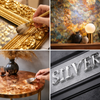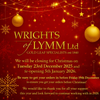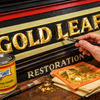The Ultimate Beginner’s Guide to Gold Leaf: Wrights of Lymm’s Expert Insights
- by Sam Wozniak
Introduction: Why Gold Leaf Remains Timeless
For centuries, gold leaf has symbolised luxury, durability, and artistry. From ancient temples to modern interiors, this thin sheet of hammered gold has adorned monumental works, fine art, and even culinary creations. Today, our team at Wrights of Lymm have helped the company grow into a trusted supplier worldwide for artists, restorers, and hobbyists to explore the beauty of gilding with professional tools and materials.
In this guide, we’ll explore the essentials of gold leaf: what the carat system means, the difference between 23.5 carat and 24 carat, loose vs. transfer leaf, and the subtleties of light, medium, and hard press sheets. Whether you’re restoring a frame, creating art, or working on a restoration project, this post will help you choose the right goldleaf for your needs.
Understanding Carats in Gold Leaf
Carat weight determines the purity of gold in a leaf, and this affects both colour and performance in gilding projects.
-
24 Carat Gold Leaf
24 carat is pure gold with no alloys. It has a rich, deep yellow colour and is ideal for projects where longevity and tarnish-resistance are essential. Culinary applications, fine art, and indoor decorative gilding often use 24 carat gold leaf. -
23.5 Carat Gold Leaf
Slightly less pure than 24 carat, 23.5 carat gold leaf includes trace amounts of alloys that make it more durable. It is especially useful in monumental or outdoor gilding projects where exposure to elements requires greater resilience.
Which should you choose?
-
Choose 24 carat if you want purity and brilliance (perfect for art, interiors or exteriors, or edible gold).
-
Choose 23.5 carat for tougher projects like weather vanes, statues, and outdoor restoration where durability is crucial.
Loose Leaf vs. Transfer Gold Leaf
When selecting goldleaf, one important choice is whether to use loose leaf or transfer leaf. Both are genuine, but they suit different applications.
-
Loose Leaf
Loose leaf is delivered in booklet form, where delicate sheets sit between protective tissue. It’s best for highly detailed work, such as carved frames or intricate ornamentation, where flexibility is required. Loose leaf demands precision and patience. -
Transfer Leaf
Transfer gold leaf comes lightly pressed onto a backing sheet, making it easier to handle. You can apply it directly by pressing it onto a prepared adhesive surface. Transfer leaf is especially useful for flat or smooth areas such as signs, ceilings, or large monumental projects.
Light, Medium, and Hard Press Transfer Leaf
When ordering transfer leaf from Wrights of Lymm, you’ll encounter terms like light press, medium press, and hard press. These refer to how firmly the gold adheres to its backing sheet, affecting ease of use.
-
Light Press
The gold is only lightly attached to the transfer sheet. Ideal for delicate surfaces, allowing the leaf to release easily with minimal pressure. Suitable for curved or textured surfaces. -
Medium Press
This provides a balance between flexibility and control. Medium press is versatile and widely used for both decorative and restoration work. It’s especially helpful for beginners learning the art of gilding. -
Hard Press
The gold is firmly bonded to the backing sheet, making it perfect for large, flat, or smooth surfaces. It offers maximum control, ensuring clean lines and efficient application. Common in signage, architectural, and monumental projects.
Where to Use Gold Leaf: Practical Applications
Gold leaf is versatile, and depending on the carat and type, it can be used across many fields:
-
Art and Design: Enhance paintings, sculptures, and calligraphy.
-
Restoration: Bring antique furniture, religious icons, or historic frames back to life.
-
Monumental Gilding: Apply to domes, statues, or architectural details in exterior spaces.
-
Culinary: Use 24 carat edible leaf to decorate cakes, chocolates, and cocktails.
Why Choose Wrights of Lymm for Gold Leaf?
Wrights of Lymm is the UK’s oldest supplier of goldleaf, trusted for our craftsmanship and quality materials. We provide everything from 23.5 carat and 24 carat gold leaf to adhesives, brushes, and complete gilding starter kits. Whether you’re a professional restorer, a monumental gilder, or a beginner, Wrights ensures your materials are authentic and reliable.
Tips for Beginners in Gilding
-
Always prepare your surface carefully – smooth and sealed surfaces give the best finish.
-
Use the correct adhesive (water-based size for indoor work, oil-based for outdoor restoration).
-
Start with transfer gold leaf if you’re new—it’s easier to manage than loose leaf.
-
Practice handling techniques on small projects before attempting larger, monumental ones.
-
Invest in quality tools (like brushes, cushions, and knives) from a specialist like Wrights of Lymm.
Conclusion: Start Your Gold Leaf Journey Today
Whether you’re an artist, restorer, or decorator, understanding the types of gold leaf available is essential for achieving professional results. With Wrights of Lymm’s expertise and range of products—from 23.5 carat durable leaf for monumental projects to pure 24 carat for indoor or edible art—you’ll have everything you need to succeed.
Explore Wrights of Lymm’s selection of goldleaf kits, tools, and supplies today, and bring the timeless art of gilding into your creative practice.






